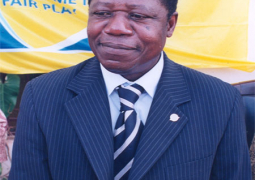Statement of The Chief Executive Secretary During the Inauguration Period of the Alternative Dispute Resolution Secretariat on the
Your Excellency the Vice President
Secretaries of State
Speaker of the National Assembly
My Lord Chief Justice
Members of the Diplomatic corps
Representatives of International Organisations
Senior Government Officials
This day is another magnanimous day simply because it turns us back to our roots. Therefore, we can say without an iota of doubt that it will go down well in the annals of Gambian history.
Alternative Dispute Resolution or African Dispute Resolution is indeed not new to our culture simply because its roots started here in African soil and its social mechanisms are alive and well entrenched in our culture and are still used in settling disputes among parties.
Nevertheless, it will be fair to say that the world in which we live is getting more and more complex because of rapid pace of development; but more complicated particularly when disputes occur. As disputes are really inevitable because nobody wants his or her interest to be threatened, we are all duty bound to jealously protect our interest. Under such circumstances inevitably, disputes will always occur but then pragmatic mechanisms must be in place in order to amicably settle these disputes. This is fundamentally one of the factors why ADR has been created and experimented particularly in the United
States and the
The reasons for establishing the ADR Secretariat in The Gambia are based on a combination of factors which are self explanatory within our justice system. The Gambian people have attained a stage where they have simply opted to go back to their own ways of settling disputes rather than going through the litigation process which more often than not consumes time, generates hate and is not as cost effective.
Alternative Dispute Resolution, otherwise called by the Acronym "ADR" refers to a broad range of mechanisms, methods and processes designed to assist disputing parties in resolving their disputes. In an ascending order, they include processes such as Negotiation, Conciliation, Mini Trial, early neutral evaluation, summary jury trial, Mediation and Arbitration. These alternative mechanisms are true to litigation as they are not intended to supplant court adjudication but to supplement it. These alternatives can be categorized into two broad types. The adjudicatory category where intervening third parties make the decision, and the participatory category where the parties to a dispute decide on an acceptable solution. So the Gambia Government has prominently taken the right decision in establishing the ADR Secretariat at a crucial time to help decongest the court system in seeing that justice is seen done because the advantages are unquantifiable.
The foundation of this noble initiative was laid down when one of the former Attorney General was envisioned with bringing Alternative Dispute Resolution into the frame work of our judicial reform. Consequently a committee was formed comprising experts from the Attorney General's Chambers, the Judiciary and the Office of the Ombudsman, to look into ways of developing strategies that would create a mechanism for conflict resolution and peaceful settlement of disputes.
Following the constitution of this committee, meetings were held on a series of occasions in 2004 and participants were able to identify and contact sister institutions using Alternative Dispute Resolution as a means of conflict resolution. Research into the feasibility of incorporating ADR into The Gambia legal system was also conducted by the Attorney General's Chambers.
As a member of the committee I also gave vivid insights in to how ADR could be utilized to decongest the courts by using arbitration, mediation, conciliation and negotiation to settle disputes tapping from my experience in the
The ADR Act was subsequently passed and Gambians trained abroad to develop the human resource base.
Since studies have indicated enormously high satisfaction that ADR has an rate amongst its beneficiaries - in part, because they have the power to shape the proceedings and determine the outcome, It is hoped and believed that it will help immensely in decongesting the courts with cases that have been awaiting trial.
Additionally, litigants, members of the civil society and people within the commercial sector, land, employment and families will benefit from expeditious and satisfactory redress to conflicts administered by ADR. I am pleased, to stand here today and inform you that the Secretariat has successfully been set up.
To conclude, I would like to seize this opportunity once again to extend our sincere gratitude to The President of The Republic, the entire Cabinet and our development partners for their untiring and invaluable support to our development and the judicial reform process. Allow me also, to commend the efforts of our abled Attorney General and Secretary of State for Justice, Mrs. Marie Saine-Firdaus who has been instrumental in establishing the Secretariat and has continuously struggled in an effective manner to mobilize support for the institution, which is a clear testimony of her unflinching commitment to the .Judicial Reform in the country. Our profound thanks also goes to Mrs. Awa Bah, Mrs Mowoe, Mrs Jainaba Bah-Sambou and Mr. Fansu Jatta who have worked tirelessly in the process of establishing the ADR Secretariat particularly during the recruitment process of our staff and all those members of staff of the Department of State for Justice who have, in one way of the other, contributed to the establishment of the new Secretariat.
Thank you all for your kind attention.




